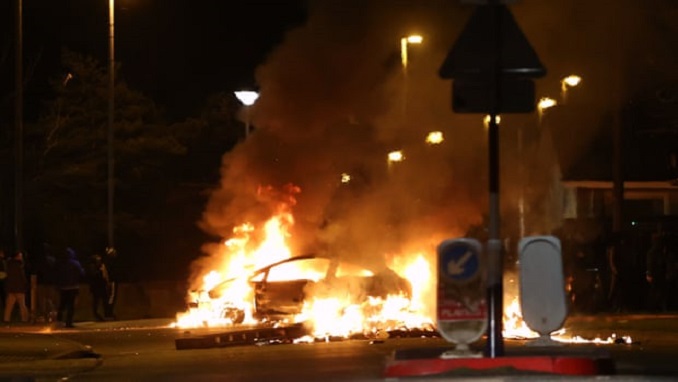New incidents of violence were reported in Northern Ireland through Monday evening, despite calls for appeasement from local police, Sputnik reports.
The Guardian reports that new outbreaks of violence were witnessed in Carrickfergus town, near the capital Belfast, while photos show that a car and a digger were set alight in the Waterside area of Derry.
Police Service of Northern Ireland (PSNI) Chief Superintendent Davy Beck urged the local community leaders to stop the unrest, while dubbing the attacks “clearly orchestrated”.
“I believe that there’s a small group of disaffected criminal elements that are clearly involved in influencing young people, and I would appeal to young people in those areas not to allow this to happen,” CH Supt Devy said.
According to police, children as young as 12 have been involved in some of the violent incidents in the last few days, as PSNI signalled on Monday that they were prepared for another night of unrest. Masked drum-beating loyalist bands were also spotted on Monday as they marched through the cities of Portadown and Markethill, prompting condemnation from Sinn Fein politician John O’Dowd, who saw this as an attempt to “intimidate families out of their homes”.
“Irresponsible and dangerous sabre rattling and reckless rhetoric from Unionist politicians has seen tensions rise right across the community,” the member of the Legislative Assembly wrote on his party’s website.
Just on Sunday, at least five police officers were injured after being attacked with bricks and petrol bombs in Belfast in a third night of violence, which has now spilled from the Easter weekend to Monday. It is estimated that 32 police officers have suffered from injuries since last week after clashing with a loyalist community that has been decrying the Northern Ireland Protocol, part of the Brexit deal.
Ulster unionists believe that the deal has effectively created a border in the Irish Sea, separating Northern Ireland from the rest of the UK with checks on goods travelling from Great Britain.
Anger ramped up further last week following a controversial decision not to prosecute 24 Sinn Féin politicians for attending a large-scale republican funeral during Covid-19 restrictions. All the main unionist parties have demanded the resignation of PSNI chief constable Simon Byrne, claiming he has lost the confidence of their community.
Meanwhile, in County Antrim, a recent series of drug seizures against the South East Antrim UDA – a renegade faction of the main grouping – have caused particular ill-feeling towards police. The faction is believed to have been behind the disturbances in Newtownabbey on Saturday.
A Sinn Féin funeral was the spark but loyalists in Northern Ireland have been throwing petrol bombs and burning cars partly because they fear political marginalisation.
The union flag no longer flutters daily over Belfast city hall, a trade border separates the region from the rest of the UK and the police are allegedly beholden to Sinn Féin. Add to this a criminal gang’s resentment at recent arrests and you have the context for three consecutive nights of rioting in several towns that have left dozens of police officers injured, including five on Sunday night.
“Sinister” elements with paramilitary links were directing younger people against police, Mark Lindsay, the chair of the Police Federation, told the BBC on Monday. “Some don’t even know why they are attacking them, they’re simply doing as they’re told or it’s seen by some as a bit of fun or recreational.”
Unionists, nationalists and non-aligned parties share power in the Stormont executive but toxic relations between the Democratic Unionist party (DUP) and Sinn Féin, locked in a loveless marriage, make the political climate radioactive.
The Northern Ireland protocol – the part of the Brexit deal that requires checks on goods entering the region from Great Britain – dismays unionists and loyalists who worry it could become an ante-chamber to Irish unity. Many view it as the latest in a litany of perceived or real concessions to nationalists and the Irish government since the 1998 Good Friday agreement.
Officials in Brussels, Dublin and London may have viewed the protocol in technical terms but for loyalists it was an erosion of sovereignty and a betrayal by the British government, said Peter Shirlow, a director at the University of Liverpool’s Institute of Irish Studies and an authority on unionism. “There is an anger in loyalism, a real strong sense of frustration.”
He said a generation born after the Good Friday agreement viewed political compromises inherent in the agreement as defeats. “In the world in which a lot of these young lads live, it’s concession, concession, concession. They see the wind of change moving in one direction. They’re constantly told the other side is winning.”
